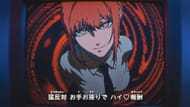MAPPA's Chainsaw Man is one of the most hyped anime that has premiered in recent times. The anime not only had amazing animation for the story, but the studio also animated 12 unique end credits, with songs from 12 different artists. Thus, each episode of the anime had its own unique end credits.
Tatsuki Fujimoto's Chainsaw Man follows the story of a poor boy named Denji, who in an attempt to pay off his father's debts, became a devil hunter. However, after he gets betrayed by the Yakuza, the chainsaw devil Pochita fused his heart with Denji's to allow him to become Chainsaw Man.
Why does Chainsaw Man have different endings?

MAPPA has gone above and beyond to create 12 visually appealing unique end credits for Chainsaw Man.
To provide a more immersive viewing experience for fans, the studio created these end credits with visual storytelling and lyrical representations. This helps viewers understand what is happening in the episode or even the entire season, with foreshadowing and symbolism in the imagery and lyrics.
Additionally, these unique end credits allow animators to experiment beyond the show's own style.

Here are the names of the 12 end-credit songs and their artists:
- Chainsaw Blood by Vaundy
- Time Left by Zutomayo
- Hawatari Niku Centi by Maximum the Hormone
- Tablet by TOOBOE
- In the Backroom by Syudou
- Rendezvous by Kanaria
- Chu, Tayousei by Ano
- First Death by TK from Ling Tosite Sigure
- Deep Down by Aimer
- Dogland by People 1
- Violence by Queen Bee
- Fight Song by Eve
What do each of the endings signify?
Each of these end-credit sequences has its own vibe and unique animation. The first episode's end credits featured scenes from the first episode itself, as the rock music helped set the tone of the anime.
The second-ending sequence showed fans the change in Denji's life, as he could be seen sleeping on top of trash. Following this, he fell down to the streets of Tokyo, where he met his buddies, Aki and Power. This showed how Denji had managed to make some new connections.
The third ending basically summarized the anime till that point as it depicted Denji's chainsaw powers in the rawest form. Meanwhile, the fourth ending basically featured Power in different outfits on a red background, depicting her as the Blood Devil Fiend.
The fifth ending majorly featured kaleidoscopic imagery as the episode itself featured the Eternity Devil, and the ending helped set the tone for the same. The sixth end-credit sequence also featured similar imagery.
The seventh end-credit sequence featured a retro game/show look as it featured a fanmade art of Makima. The second half of the ending sequence featured the female characters in the series.
The eighth ending sequence majorly featured Aki and Himeno as this was around the time when the Katana Man and Akane Sawatari attacked Public Safety, leading to Himeno's death.
The ninth ending sequence's focus was Himeno's death as the melodramatic song helped set the tone of the story. The tenth and eleventh ending sequences were quite unique themselves. While they do not seem to particularly depict anything, the studio did take the chance to experiment with new types of animations, featuring raw manga-like and cybernetic animations.
Lastly, the twelfth ending sequence featured Denji, Power, and Aki as they could be seen enjoying their time together. This was a fun way to end the anime that had such darker tones.
